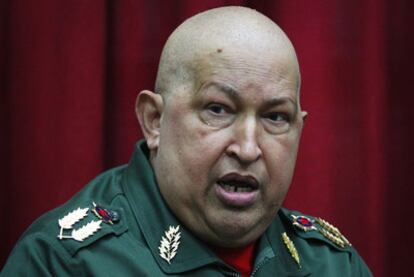Political speculation grows as Chávez's appearance worsens
"I keep asking God to keep providing me with life, health and energy," says Venezuelan president
On Monday Hugo Chávez was seen on television meeting with a business delegation from Belarus. On Saturday, he appeared during a morning broadcast handing out appliances to poor families and presiding over a Cabinet meeting in the afternoon. The day before, Chávez spoke by phone to a panel on an analytical program broadcast by state broadcaster Venezolana de Televisión (VTV). And on Thursday he made four radio and television appearances.
It was one of his biggest publicity blitzes after staying behind the scenes since returning on September 23 from Cuba, where he is being treated for cancer.
But each day Chávez appears more bloated and yellow with jaundice. Yet he keeps insisting that he is feeling better and on his way to recovery.
"I keep asking God to keep providing me with life, health and energy. Personally, I am in the 11th day of the last chemotherapy cycle. I am not at all in any danger," he said Saturday as he handed out appliances.
This is how Chávez has been trying to quell rumors as to the seriousness of his condition after El Nuevo Herald in Miami published a report last week, quoting medical sources, that Chávez had to be taken by emergency to a military hospital in Caracas, suffering from kidney failure.
The following day after the report, he appeared in the gardens of the Miraflores presidential palace playing baseball with his ministers, rejecting the report.
Since Chávez acknowledged on June 30 that he was suffering from cancer, there has been a lot of speculation as to how serious his condition is. In the past three months, the Venezuelan leader has declined to reveal what type of cancer he has or what organs have been affected.
On several occasions he has grown angry during news conferences when reporters badger him about his illness. "I have said enough already" is his standard response.
As next year's general elections approach, the Venezuelan opposition is set to vote on February 12 for its own candidate who will try to unseat Chávez.
The socialist leader insists his health won't be an impediment to his desire to run for re-election next October, when he will bid for a third consecutive six-year term. Chávez pulled up the election date, which was originally set for December 2012.
With recent polls giving him an approval rating of more than 50 percent, Chávez insists that he is ahead. However, other recent polls have begun to show who would be in a better position to take over the candidacy should Chávez be forced to back out. Among the names that are surfacing include Vice President Elías Jaua; Barinas governor Adán Chávez, who is also the president's brother; and Foreign Minister Nicolás Maduro.

Tu suscripción se está usando en otro dispositivo
¿Quieres añadir otro usuario a tu suscripción?
Si continúas leyendo en este dispositivo, no se podrá leer en el otro.
FlechaTu suscripción se está usando en otro dispositivo y solo puedes acceder a EL PAÍS desde un dispositivo a la vez.
Si quieres compartir tu cuenta, cambia tu suscripción a la modalidad Premium, así podrás añadir otro usuario. Cada uno accederá con su propia cuenta de email, lo que os permitirá personalizar vuestra experiencia en EL PAÍS.
¿Tienes una suscripción de empresa? Accede aquí para contratar más cuentas.
En el caso de no saber quién está usando tu cuenta, te recomendamos cambiar tu contraseña aquí.
Si decides continuar compartiendo tu cuenta, este mensaje se mostrará en tu dispositivo y en el de la otra persona que está usando tu cuenta de forma indefinida, afectando a tu experiencia de lectura. Puedes consultar aquí los términos y condiciones de la suscripción digital.








































